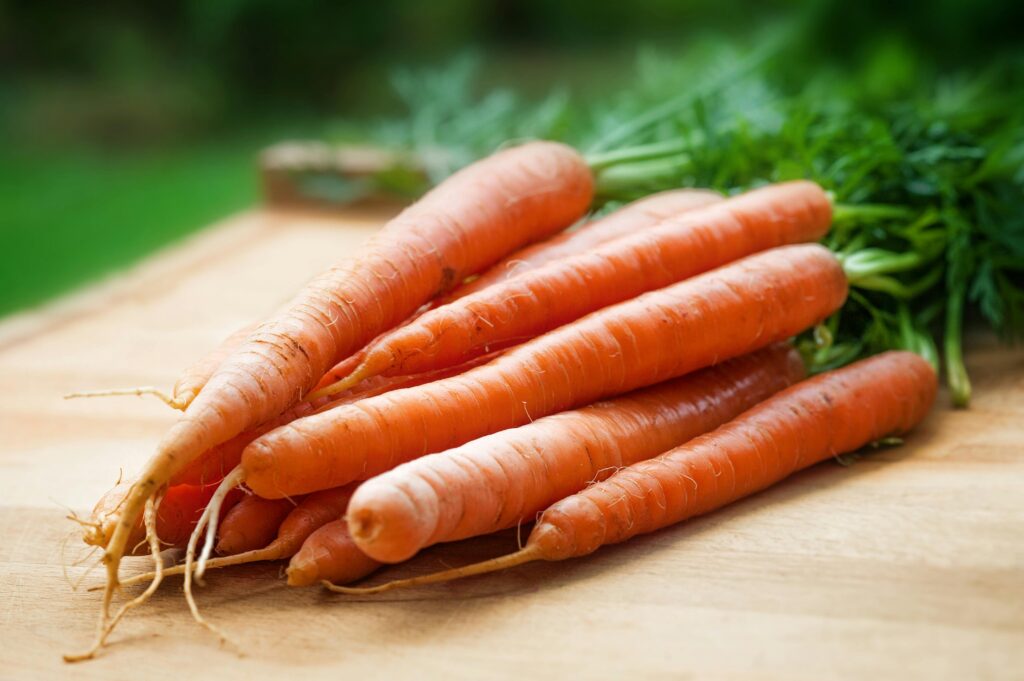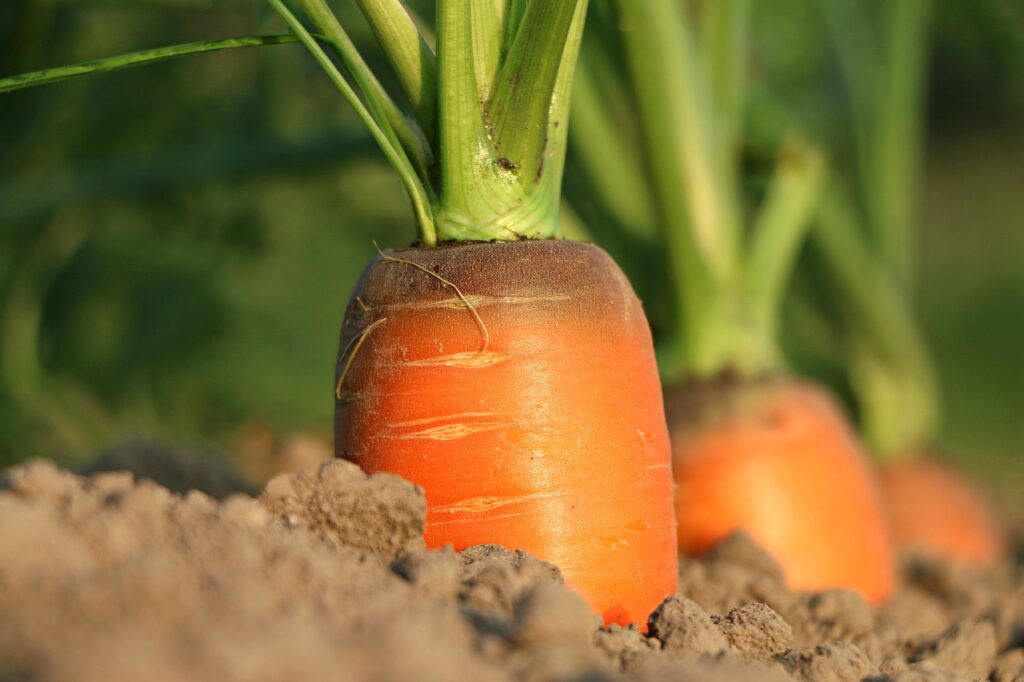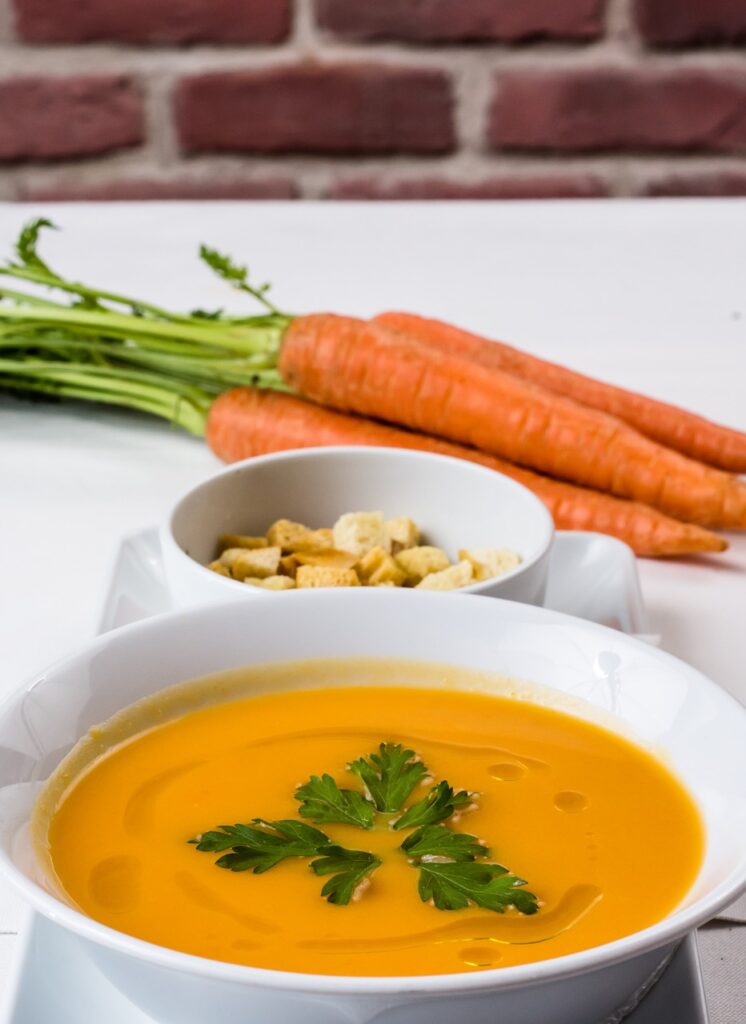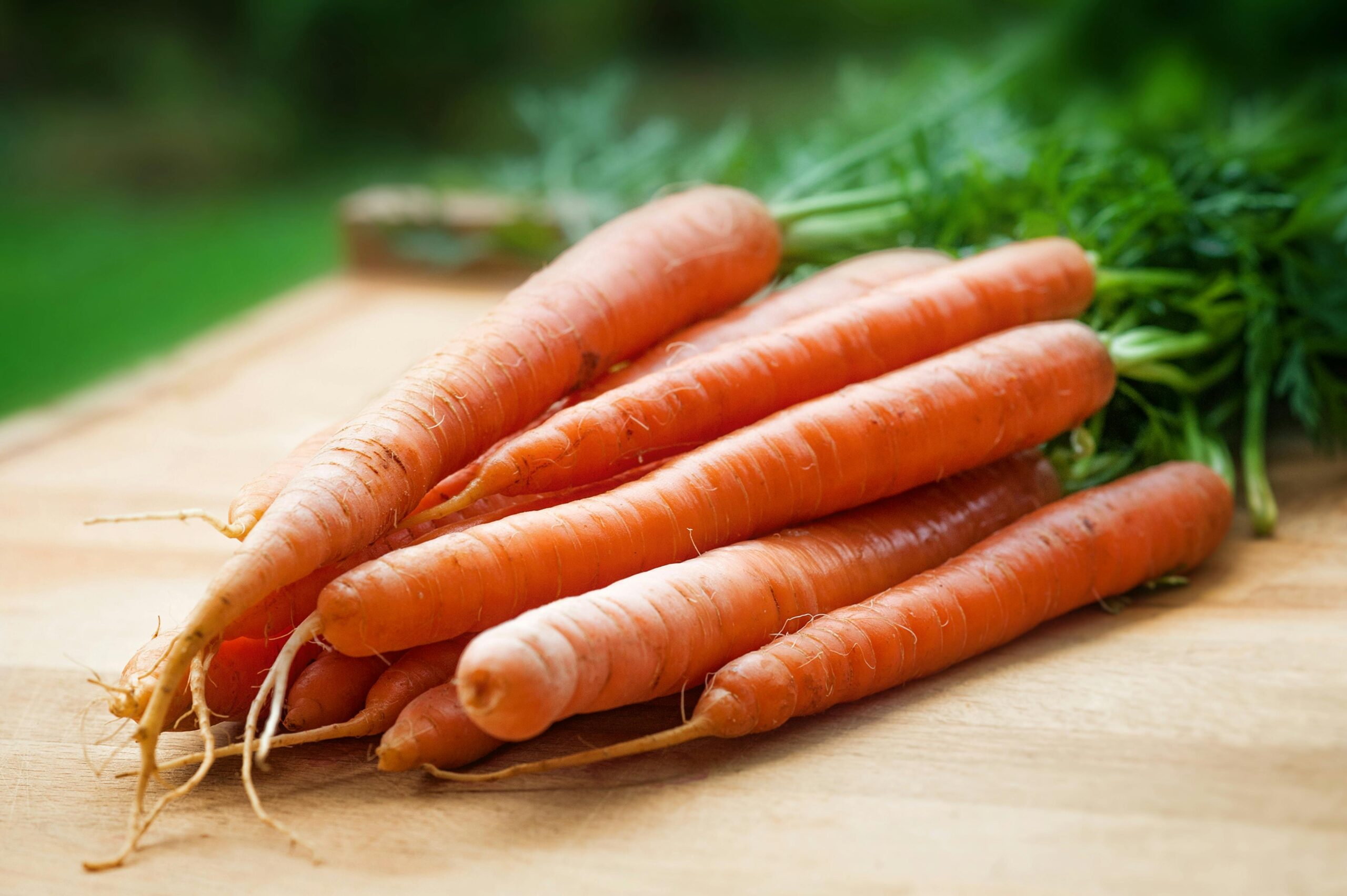Everything You Need to Know About Carrots: Nutrition, Growing, and Recipes”
Carrots, the humble root vegetable, are more than just a crunchy snack or a side dish. Packed with nutrients, carrots have a fascinating history, and they can be grown with ease at home. In this blog, we will dive into the nutritional benefits of carrot, their rich history, tips on how to grow them, and the many ways they can be used in cooking.
Table of Contents
1. Introduction to Carrot
Carrots (Daucus carota) are root vegetables that come in a variety of colors, shapes, and sizes. Though orange is the most popular color, you can find carrots in shades of yellow, purple, red, and even white. They are versatile, delicious, and extremely nutritious.
Carrots are a staple in many American kitchens, from stews to salads, but they are much more than just a kitchen basic. With the right care, you can grow them at home and add a homegrown crunch to your meals.
Growing up, carrots were always a staple in my home, but it wasn’t until I started cooking for my own family that I fully appreciated their versatility. From soups and salads to roasted and pureed forms, carrots can take on so many flavors and textures. One of the most memorable experiences I had with carrots was during a trip to a local farmer’s market, where I discovered heirloom carrots in purple and yellow shades. This opened my eyes to the depth of flavor this root vegetable offers, and since then, I’ve been experimenting with different ways to bring out the best in them.

2. The Nutritional Powerhouse of Carrot
Carrots are famous for their high beta-carotene content, which the body converts into vitamin A, essential for eye health. But that’s just one of the many nutrients that make carrots a health powerhouse.
Key Nutrients in Carrots (per 100g serving):
- Calories: 41 kcal
- Carbohydrates: 9.6g
- Fiber: 2.8g
- Vitamin A: 835µg (93% of the RDI)
- Vitamin K: 13µg (16% of the RDI)
- Vitamin C: 5.9mg (7% of the RDI)
- Potassium: 320mg (9% of the RDI)
Want to more Nutrition full details you can click here
Health Benefits of Carrot:
- Promotes Eye Health: The vitamin A from beta-carotene is essential for maintaining good vision.
- Boosts Immune Function: Carrots are rich in vitamin C, which supports the immune system.
- Supports Heart Health: Carrots provide fiber and potassium, helping regulate blood pressure and cholesterol levels.
- Antioxidant-Rich: They are a source of antioxidants like carotenoids, which can reduce the risk of chronic diseases.
3. A Brief History of Carrot
Carrots have been cultivated for over 5,000 years, with origins traced back to Afghanistan, where they were first grown as a purple or yellow root. They were initially prized for their aromatic seeds and leaves before the root itself became the focus of cultivation.
By the 16th century, Dutch farmers developed the orange variety we know today by selectively breeding the naturally occurring orange carrot. This color was chosen in honor of the Dutch royal family, the House of Orange. Carrots then spread across Europe and eventually reached America with early settlers.
4. How to Grow Carrots in Your Garden
Carrots are relatively easy to grow and thrive in cool weather. They are best planted in early spring or late summer for a fall harvest.

How to Grow Carrots:
- Choose the Right Spot: Carrots grow best in loose, well-drained soil with full sun.
- Sow Seeds: Plant seeds directly in the soil, 1/4 inch deep, with rows spaced about 12 inches apart.
- Water Regularly: Keep the soil moist but not waterlogged. Carrots require consistent watering to prevent the roots from becoming woody.
- Thin the Plants: Once the plants are about 2 inches tall, thin them to about 2-3 inches apart to allow space for root growth.
- Harvest: Carrots are usually ready to harvest 70-80 days after planting. Gently pull them from the ground when they reach the desired size.
5. Culinary Uses of Carrot
Carrots are incredibly versatile and can be used in countless recipes. Whether you’re looking for a snack or a main course, there’s a carrot dish for every occasion.
Popular Ways to Use Carrots:
- Raw: Add shredded carrots to salads, or simply enjoy them as a crunchy snack.
- Roasted: Roasting brings out their natural sweetness. Combine them with herbs like thyme and rosemary.
- Soups and Stews: Carrots add depth and flavor to soups, especially in chicken or beef broth-based dishes.
- Baking: Carrots are a star ingredient in carrot cake or carrot muffins, providing moisture and natural sweetness.
- Juices and Smoothies: Carrots blend well with fruits and other vegetables for a refreshing and healthy drink.
6. Popular Carrot Recipes
Here are some delicious recipes featuring carrots that are sure to be a hit in your kitchen:
1. Carrot and Ginger Soup
Ingredients:
- 2 lbs carrots, peeled and chopped
- 1 onion, diced
- 2 tbsp fresh ginger, minced
- 4 cups vegetable broth
- Salt and pepper to taste
Instructions:
- Sauté onions and ginger in a pot until soft.
- Add carrots and broth. Bring to a boil, then simmer for 20 minutes.
- Blend the mixture until smooth, season with salt and pepper, and enjoy!


2. Roasted Carrots with Honey Glaze
Ingredients:
- 1 lb carrots, peeled and cut
- 2 tbsp olive oil
- 1 tbsp honey
- Salt and pepper to taste
Instructions:
- Preheat oven to 400°F (200°C).
- Toss carrots with olive oil, honey, salt, and pepper.
- Roast for 25-30 minutes until golden brown and tender.
7. Tips for Incorporating More Carrots into Your Diet
Here are some quick and easy ways to add more carrots into your meals:
- Add shredded carrots to smoothies or juices.
- Use carrot sticks as a healthy snack paired with hummus or yogurt dip.
- Grate carrots into pancake or muffin batter for extra moisture and sweetness.
- Include carrots in stir-fries and rice dishes for added crunch.
8. FAQs About Carrots
Q: Are carrots good for weight loss?
A: Yes! Carrots are low in calories and high in fiber, making them a great choice for weight loss.
Q: Can you eat carrot greens?
A: Yes, carrot greens are edible and can be used in pesto or added to salads.
Q: How long do carrots last in the fridge?
A: Whole carrots can last up to 3-4 weeks in the refrigerator when stored properly.
Conclusion
Carrots are an incredible vegetable with a rich history, numerous health benefits, and endless culinary possibilities. Whether you’re growing them in your garden or using them in your favorite recipes, carrots are a nutritious and versatile addition to any diet. Incorporating them more often into your meals can boost your overall health and add a splash of color to your plate.
“Try one of these delicious carrot recipes today and let us know your favorite.





